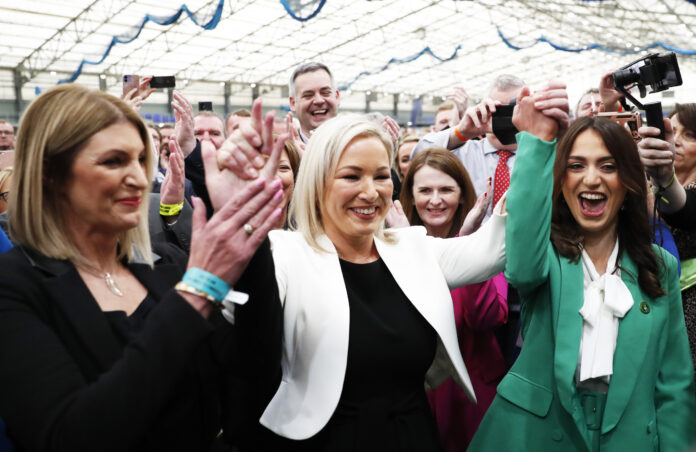The Irish nationalist party Sinn Fein was widely expected to become the largest group in the Northern Ireland Assembly for the first time, giving it the right to the post of first minister in Belfast, as vote-counting in this week’s local election resumed Saturday.
A Sinn Fein win would bring its ultimate goal of a united Ireland a step closer. It would be a milestone for a party long linked to the Irish Republican Army, a paramilitary group that used bombs, bullets and other violence to try to take Northern Ireland out of U.K. rule during decades of unrest, battling against the British Army and Royal Ulster Constabulary, as well as Protestant Loyalist paramilitaries, who contributed to the violence.
Ireland faces political gridlock as Sinn Fein surges in polls – Feb 9, 2020
But Sinn Fein has kept unification out of the spotlight this year during a campaign that has been dominated by more immediate concerns, namely the skyrocketing cost of living. Party leaders have indicated there will be no immediate moves for a referendum on a united Ireland, and no constitutional change would take place until voters decide on it.
With more than two-thirds of 90 seats counted so far, results on Saturday showed that Sinn Fein has 21 seats, while the Democratic Unionist Party, which has been the largest in the Northern Ireland Assembly for two decades, has 19.
The centrist Alliance Party, which doesn’t identify as either nationalist or unionist, has seen support surge and is set to be the other big winner of this year’s local U.K. elections. It has 14 seats so far.
Read more:
Sinn Fein, once linked to IRA, poised for ‘seismic’ victory in Northern Ireland elections
Unionist parties have led the government since Northern Ireland was formed as a Protestant-majority state in 1921.
While a Sinn Fein win would be a historic shift that shows diluting support for unionist parties, it’s far from clear what happens next.
Trending Stories
Canada needs new homes built, but construction industry headed for retirement wall
Gen. Jonathan Vance stripped of Order of Military Merit after guilty plea, discharge
Under a mandatory power-sharing system created by the 1998 peace agreement that ended decades of Catholic-Protestant conflict, the jobs of first minister and deputy first minister are split between the biggest unionist party and the largest nationalist one. Both posts must be filled for a government to function, but the Democratic Unionist Party has suggested it might not serve under a Sinn Fein first minister.
The DUP has also said it will refuse to join a new government unless there are major changes to post-Brexit border arrangements, known as the Northern Ireland Protocol, that are opposed by many unionists.
READ MORE: Once the IRA’s political wing, Sinn Fein leading Northern Ireland election polls
The post-Brexit rules, which took effect after Britain left the European Union, have imposed customs and border checks on some goods entering Northern Ireland from the rest of the U.K. The arrangement was designed to maintain an open border between Northern Ireland and EU member Ireland, a key pillar of the peace process.
But it angered unionists, who maintain that the new checks have created a barrier between Northern Ireland and the rest of the U.K. that undermines their British identity.
In February, the DUP’s Paul Givan resigned as first minister as post-Brexit tensions triggered a fresh political crisis in Northern Ireland.
Polling expert John Curtice, a professor of political science at the University of Strathclyde, said the Northern Ireland results from the local elections Thursday are a legacy of Brexit.
“The unionist vote has fragmented because of the divisions within the community over whether or not the Northern Ireland Protocol is something that can be amended satisfactorily or whether it needs to be scrapped,” he wrote on the BBC website.
The Travel Lady: The ‘real Ireland’ that guided tours often miss – Mar 22, 2022
Persuading the DUP to join a new government will pose a headache for British Prime Minister Boris Johnson, he added. Johnson’s own Conservative party lost at least 450 seats in this week’s local election.
Sinn Fein vice president Michelle O’Neill said the party wanted to work “in partnership with others.”
“That is the only way we will achieve much, much more for people here, whether in terms of the cost-of-living crisis or trying to fix our health service,” she said.
She also said with regard to Irish unification, there would be no constitutional change until voters decide on it.
Still, Sinn Fein leader Mary Lou McDonald indicated Friday that planning for any unity referendum could come within the next five years.
The full results of Thursday’s local election, which uses a system of proportional representation, were expected later in the weekend.
Northern Ireland’s new legislators will meet next week to try to form an executive body. If none can be formed within six months, the administration will collapse, triggering a new election and more uncertainty.
© 2022 The Associated Press



